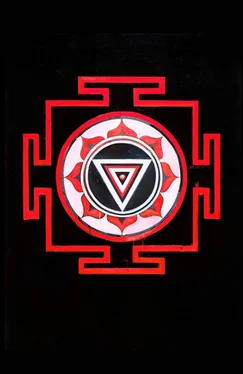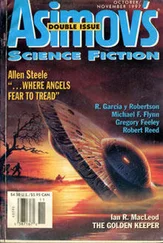‘Concannon -’
‘You and me,’ he said, softening his voice and forcing a smile almost exactly like a scowl of pain. ‘We’re the same, you and me. I know you. I fuckin’ know you.’
‘You don’t know me.’
He snarled, whirling his head around, and spitting on the ground.
‘I mean, that faggot, think about it. If the whole world was like him, the human race would die out.’
‘And if the whole world was like you, Concannon, we’d deserve to.’
It was hard; too hard. Who was I to throw stones? But I loved Didier, and I’d had all of Concannon I could take for one long day.
His eyes flashed with sudden murderous fury, and I stared back at him, thinking that I’d been tied up and beat up that day, and he could stare all he wanted.
I started the bike, kicked away the side-stand, and helped Kavita to climb up behind me. We rode away without looking back.
‘That guy,’ she shouted, leaning over my shoulder, her lips touching my ear, ‘is out of his bloody mind, yaar.’
‘I only met the guy once before,’ I shouted back. ‘He seemed kind of okay.’
‘Well, somebody emptied his okay basket,’ Kavita said.
‘You could say that about most of us,’ I replied.
‘Speak for yourself,’ Kavita laughed. ‘My basket is a horn of plenty, baby.’
I wasn’t laughing. The look in Concannon’s eyes stayed with me. Even as I brushed aside Lisa’s pain and concern, apologised to her, kissed her, and sat on a wobbly stool in the bathroom while she cleaned and dressed the cuts on my face, I saw Concannon’s eyes: omens in a cave.
‘It suits Lin, this look,’ Kavita said to Lisa, claiming a comfortable place on the couch after I’d been patched up. ‘I think he should pay someone to do it at least once every month. I’ve got a couple of girlfriends who’d do it for free.’
‘You’re not helping, Kavita. I mean, look at him. That’s what a car accident would look like, if cars were made out of people.’
‘Okay,’ Kavita said, ‘I’m really not wanting to get that image in my mind.’
Lisa frowned, and turned back to face me, her hand cradling the back of my head.
‘You’re not going to tell me what the hell happened, are you?’
‘Happened?’
‘You’re a sick man,’ she declared, pushing me away. ‘Did you at least eat something today?’
‘Well… I got kinda busy.’
‘Kavita, will you cook for us? I’m just too emotional to cook right now.’
Kavita cooked one of my favourites, yellow dhal and aloo ghobi , spiced cauliflower-potato mix. It was pretty good, too, and I didn’t know how much I needed it until I ate it. After we cleaned up quickly, we sat together to watch a movie.
It was Konchalovsky’s film of Kurosawa’s Runaway Train , with John Voight riding fearless into the white sky that every outlaw finds, sooner or later, on the horizon of violent desire.
Kavita, who condemned it as testosterone terrorism, insisted that we watch it a second time, but with the sound turned to zero, and with each of us speaking the parts of the characters. We ran the movie again, and laughed our way through the second viewing.
I played the game, making up lines for the characters Kavita gave me, desecrating the beloved movie, but as the light from that runaway train poured onto our laughing faces in the darkened room, other images and other faces from another dark place, earlier that long day, rained into me.
When Lisa put a new film in the player I stood, gathered my keys, and put my two knives into the scabbards.
‘Where are you going?’ Lisa asked from the couch, where she was snuggled in beside Kavita.
‘I’ve got something I have to do,’ I replied, leaning over to kiss her on the cheek.
‘You’re gonna what ?’ she demanded. ‘We’re gonna watch another movie here! My choice, this time. It’s not fair that I have to see your testosterone terrorism, and you don’t have to see my oestrogen ecstasy.’
‘Let him go,’ Kavita said, cuddling close. ‘We’ll have a girls’ night in.’
At the door to the living room I turned to look at them again.
‘If I don’t come back tonight,’ I said, ‘don’t give my stuff away, because I always come back.’
‘Very funny,’ Lisa said. ‘Tell me, did you have a stamp collection, when you were a kid?’
‘Please, Lin,’ Kavita laughed. ‘Don’t answer that question.’
‘I tried,’ I said. ‘My father stamped it out. By the way, do you think I’m grouchy?’
‘What?’ they both asked.
‘Someone, a kid I know, he said I’m grouchy. I don’t get it. Do you think I’m grouchy?’
Lisa and Kavita laughed so hard they fell off the couch. When they saw the expression on my face they laughed harder and rolled together, their legs in the air.
‘Come on, it’s not that funny.’
They screamed for me to stop.
‘Thanks,’ I said. ‘Thanks a lot.’
They were still laughing when I started my bike, pulled out of the driveway, and headed along Marine Drive toward Tardeo.
It was late, and the streets were almost deserted. A scent of iron and salt, the blood of the sea, rose from the crests of waves, exhausting themselves on the walls of the wide bay. That scent rode the midnight breeze into every open window on the boulevard.
Massive black clouds boiled and swarmed overhead, so close that it seemed I could reach up and touch them as I rode. Lightning, silent but sky-wide, ripped the veil of night, shredding the darkness with theatres of cloud in every silver strike.
After eight dry months, the soul of the Island City was begging for rain. Every heart, sleeping or awake, stirred to the roil and rumble of the gathering storm. Every pulse, young or old, was drumming to the rhythm of the coming rain, every sighing breath a part of the waxing wind and the flooding clouds.
I parked the bike in the entrance to a deserted alley. The footpaths nearby were empty, and the few sleepers I saw were stretched out near a line of handcarts, three hundred metres away.
I smoked a cigarette, waiting and watching the quiet street. When I was sure that no-one was awake on the block, I put my cotton handkerchief under the downpipe of the petrol tank on my bike, pulled the feeder tube free, flooded the handkerchief with petrol, and then reconnected the tube.
At the door of the warehouse where they’d slapped me around that afternoon, I broke the padlock on the chain across the door, and slipped inside.
I used my cigarette lighter to find my way to the piece of pool furniture: that banana lounge in acid-green and yellow vinyl. There was an empty drum nearby. I dragged it toward the banana lounge, and sat down.
In a few minutes, my eyes adjusted to the darkness. I made out certain objects and pieces of furniture quite clearly. Among them was a large coil of coconut-fibre rope. The rope they’d used to tie me to the pool chair had been cut from that roll.
I stood up and uncoiled the rope until it tumbled into a large, loose pile. Packing the pile of rope under the banana lounge, I stuffed the petrol-soaked scarf within the fibre strands.
There were empty cardboard cartons, old telephone books, oily rags and other inflammables in the warehouse. I dragged them into a line leading from the pool chair to a row of cabinets and benches where the power tools were displayed, and doused them with everything I could find.
When I lit the scarf it flared up quickly. The flames fluttered and then rushed into a fierce fire that began to consume the pile of rope.
Thick, musty smoke quickly filled the open space. The vinyl banana lounge was putting up a fight. I waited until the fire had prowled along the line of combustible refuse, and then left the warehouse, dragging a heavy oxy-acetylene kit with me.
Читать дальше












